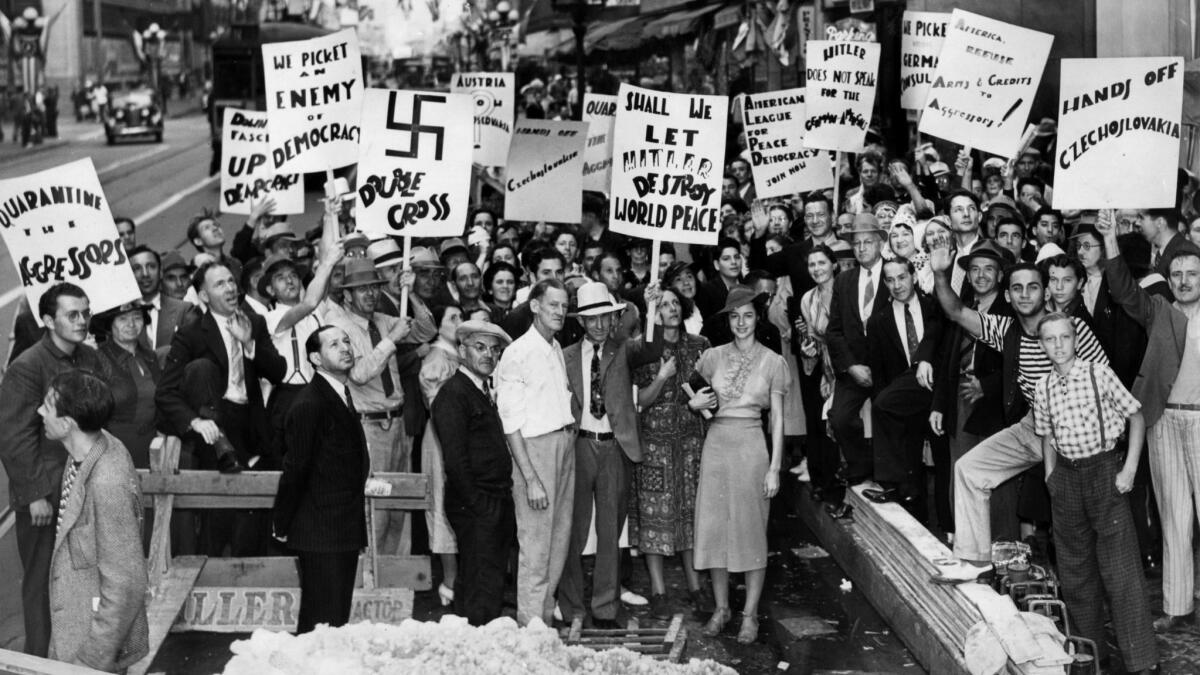Op-Ed: Eighty years before Pittsburgh, Kristallnacht emboldened Nazis in Los Angeles

- Share via
Eighty years ago this week, Nazi leaders unleashed an unprecedented wave of violence against Jews in Germany, Austria and the Sudetenland. The pogrom of Nov. 9 and 10, 1938, came to be known as Kristallnacht, or night of broken glass.
Ostensibly in response to the assassination of a Nazi diplomat by a young Polish Jew, frenzied mobs armed with sledgehammers and other weapons demolished Jewish homes, hospitals, synagogues, schools and businesses. They beat, raped or killed anyone who got in the way.
By the time order was restored, the wave of terror had left nearly 100 dead, 7,000 Jewish businesses destroyed and hundreds of synagogues burned to the ground. Over the two days of rioting, some 30,000 Jews were arrested and sent to Nazi concentration camps.
Kristallnacht had an impact in the United States, too, but not in the way you might think. Nazis in Los Angeles were emboldened by the attacks and the tepid response of the American government.
Kristallnacht had an impact in the United States, too, but not in the way you might think.
On Nov. 16, Hermann Schwinn, the West Coast leader of the German American Bund, addressed an excited crowd that had gathered to celebrate Kristallnacht at Deutsches Haus, a clubhouse for the German American Bund that was housed in a building on 15th Street near Figueroa. (The site is now a parking lot for the Los Angeles Convention Center.)
Surrounded by storm troopers dressed in full uniform, Schwinn blamed Jews for causing the massacre. American Christians were finally waking up to the Jewish menace, Schwinn said. “Within less than five years we will see Jews dangling from telephone posts and trees,” Schwinn predicted.
Inspired by Kristallnacht, Schwinn and his cohort began working toward Der Tag, “the day” when Nazis and their supporters would seize control of the American government, either through force or the ballot box. The Bund’s storm trooper unit began secretly learning hand-to-hand combat in the Hollywood Hills.
Training a military force was only part of Schwinn’s strategy. Bundists also created a network of secret cells made up of sympathetic Americans, each no larger than 10 men, to lay the groundwork for a Nazi revolution. Within a month, the Los Angeles Bund had 18 local cells and anticipated more.
Nazis were not the only ones mobilized by Kristallnacht. So was an existing anti-Nazi spy ring led by Leon Lewis, a Los Angeles attorney whom the Nazis referred to as “the most dangerous Jew in Los Angeles.”
A founding member of the Anti-Defamation League and veteran of World War I, Lewis had begun organizing the spy network in August 1933, starting with four other veterans and their wives. These men and women infiltrated Nazi and fascist groups in Los Angeles and reported on their activities.
After Kristallnacht, Lewis and his fellow spymaster Joseph Roos stepped up their efforts, expanding the undercover operation and launching a public relations campaign to alert Americans to the Nazi threat.
Lewis and Roos placed three new spies inside Nazi headquarters and recruited a series of informants to report on Nazi plots to sabotage local military installations and aircraft factories. They collated the information they received from their operatives and sent reports to local FBI, Army and Naval Intelligence offices.
Roos also began publishing a weekly newsletter, turning his spy reports into a read as gripping as any detective thriller. Over the next three years, he sent copies to government agencies, newspapers, popular magazines and influential political columnists, including the team of Robert Allen and Drew Pearson, whose syndicated columns reached millions each week.
With the local FBI, police chief and county sheriff showing little interest in monitoring anyone other than communists, Lewis and Roos worked to persuade federal authorities to deport Schwinn. A month after Kristallnacht, an assistant U.S. district attorney in Los Angeles, armed with information provided by the two spymasters, filed charges in federal court claiming that Schwinn’s citizenship had been “illegally procured.” Schwinn downplayed the charges, explaining, “It was merely a mistake which I made while filling out my application of citizenship papers.”
Mistake or not, Schwinn had to shift his attention away from Der Tag and focus instead on remaining in the United States. In June 1939, federal prosecutors, assisted by Lewis and Roos, persuaded Judge Ralph Jenney to revoke Schwinn’s citizenship. Schwinn’s reign effectively came to an end.
Enter the Fray: First takes on the news of the minute from L.A. Times Opinion »
Perhaps the most significant legacy of Kristallnacht in Los Angeles would come the day after the attack on Pearl Harbor. Local FBI agents moved with incredible speed and efficiency to round up suspected German, Italian and Japanese spies.
How did authorities know whom to arrest? From the mountain of detailed information that Lewis and Roos had sent to the Justice Department. Intelligence agencies simply retyped the data provided by Lewis and Roos. As Roos would later reflect, the local FBI “had scant security information of their own.”
Americans must not forget the lessons of Kristallnacht, especially after the massacre at the Tree of Life Synagogue in Pittsburgh. Hate festers and turns violent when good people remain silent.
All but one of the citizen-spies who aided Lewis and Roos were Christian. They did not see themselves as protecting Jews. They saw themselves as protecting Americans.
Steven J. Ross is a professor of history at the University of Southern California. His book “Hitler in Los Angeles: How Jews Foiled Nazi Plots Against Hollywood and America” was a finalist for the 2018 Pulitzer Prize in history.
Follow the Opinion section on Twitter @latimesopinion or Facebook
More to Read
A cure for the common opinion
Get thought-provoking perspectives with our weekly newsletter.
You may occasionally receive promotional content from the Los Angeles Times.










